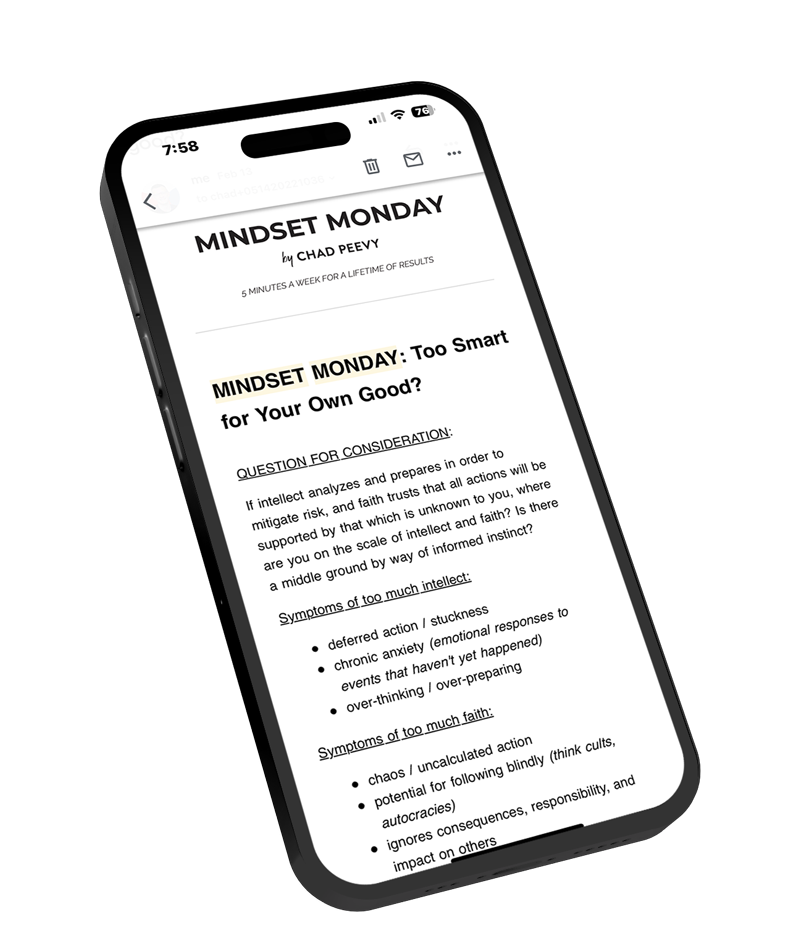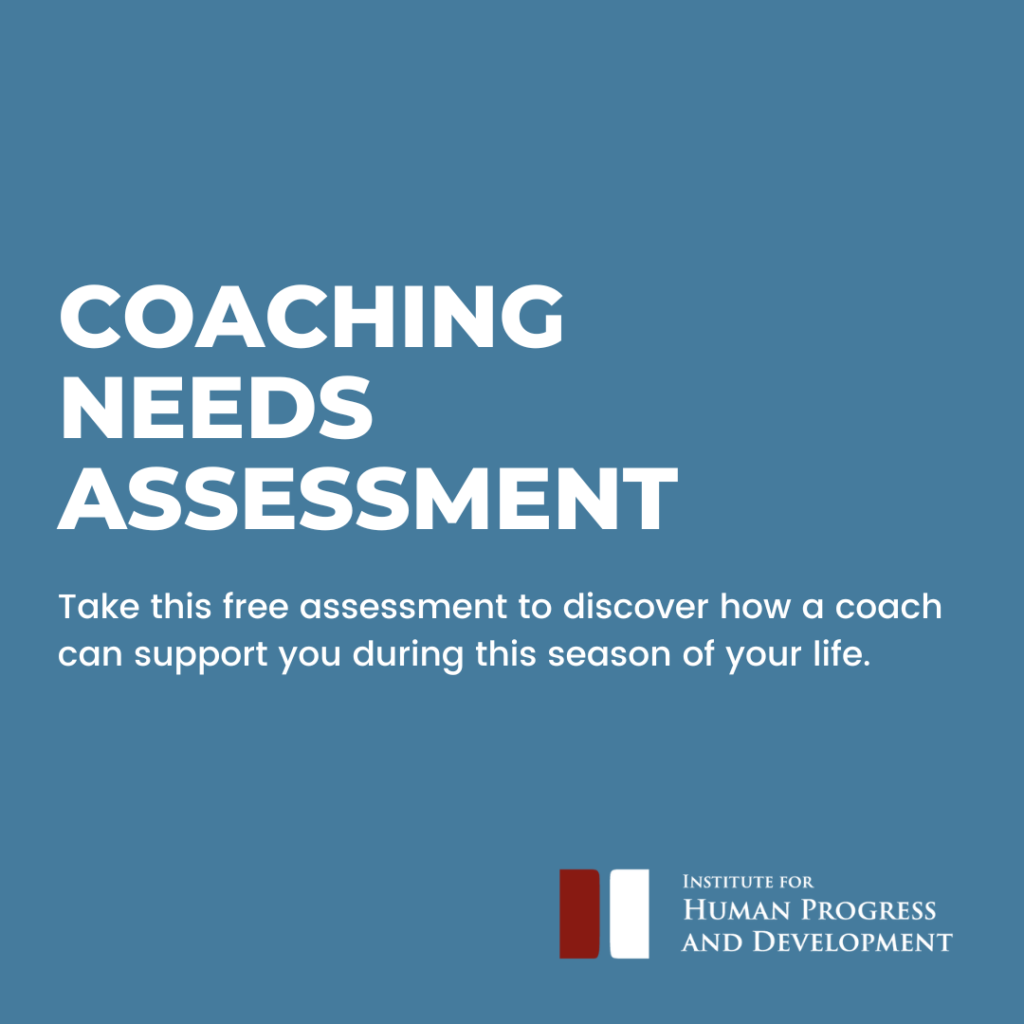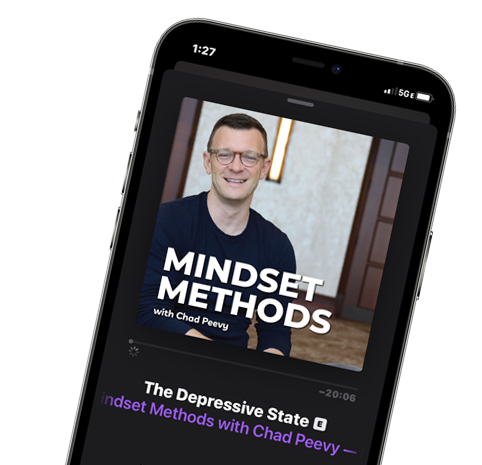Loneliness and social isolation increase the risk for premature death by 26% and 29% respectively.
Holt-Lunstad J, Smith TB, Baker M, Harris T, Stephenson D. Loneliness and social isolation as risk factors for mortality: a metaanalytic review. Perspect Psychol Sci. 2015;10(2):227-237.
Last week, the Surgeon General issued an Advisory wherein he declared that the US is experiencing an epidemic of loneliness. You can read the Advisory here.
Of all our collective problems, the one that scares me the most about our future is our inability to address the issue of loneliness. I’ve been thinking about it for a while – I even wrote about it in my book, Break & Untangle.
1 in 2 Americans report experiencing loneliness. This is a BIG problem – a sleeping giant of an issue that we absolutely must address.
It’s not just a problem for the individual feeling lonely – it’s a societal one – from which catastrophic consequences are being spawned.
While I applaud the Surgeon General for bringing this issue front and center, I believe the recommendations were politically safe and did not address some of the underlying issues that are creating this epidemic. More aggressive measures must be taken.
We are naturally social creatures – it’s how we’ve survived and thrived as a species. But right now, there are threats in our environment that are telling our natural instincts to withdraw from one another. I want to talk about those threats and present some ideas for addressing them. So in this edition of Mindset Monday, I want to take a deep dive into loneliness and offer up my own (politically incorrect) ideas for how to battle and ultimately end this epidemic.
Loneliness is a sleeping giant of an issue that we absolutely must address.
- If you care about overall well-being – we must address loneliness.
- If you care about government spending and healthcare costs overall – we must address loneliness.
- If you care about ending gun violence – we must address loneliness (and guns).
- If you care about lowering the rate of suicide – we must address loneliness.
- If you care about creating an even tolerable future for the next generation – we must address loneliness.
My thoughts are not a comprehensive list, but I do believe they are close to the core of the loneliness epidemic. I look forward to hearing your thoughts if you care to share with me.
TL;DR:
- The IRS must crack down on political entities that have hijacked churches.
- We have to admit that social media isn’t good for us as a society – and it’s getting worse.
- We have to go back to the office and limit remote work.
- We have to stop shopping for everything online.
- We have to address crime.
- We have to rethink education.
- We need a national purpose.
- We have to put term limits on Congress and the Supreme Court
The mortality impact of being socially disconnected is similar to that caused by smoking up to 15 cigarettes a day, and even greater than that associated with obesity and physical inactivity
Holt-Lunstad J, Robles TF, Sbarra DA. Advancing social connection as a public health priority in the United States. Am Psychol. 2017;72(6):517-530
In my book, Break & Untangle, page 235, I listed the 6 types of loneliness. They are:
- Attachment: satisfies needs of security and commitment.
- Social integration: satisfies our needs for companionship, shared concerns, and activities.
- Opportunity for nurturance: satisfies our need to be needed and to experience a sense of responsibility for others.
- Reassurance of worth: satisfies our need to be seen as competent and valued.
- Reliable alliance: satisfies our need for those relationships that create a sense of continuing assistance.
- Guidance: satisfies our need for relationships that offer us trustworthy advice.
What’s important to remember about these 6 types of loneliness is that they demonstrate that we can be around people all the time and still feel lonely. We need a mix of interactions, connections, and relationships in order to satisfy our social needs. Our social needs exist in a stack, all of which need to be present in order to maintain a healthy social balance.
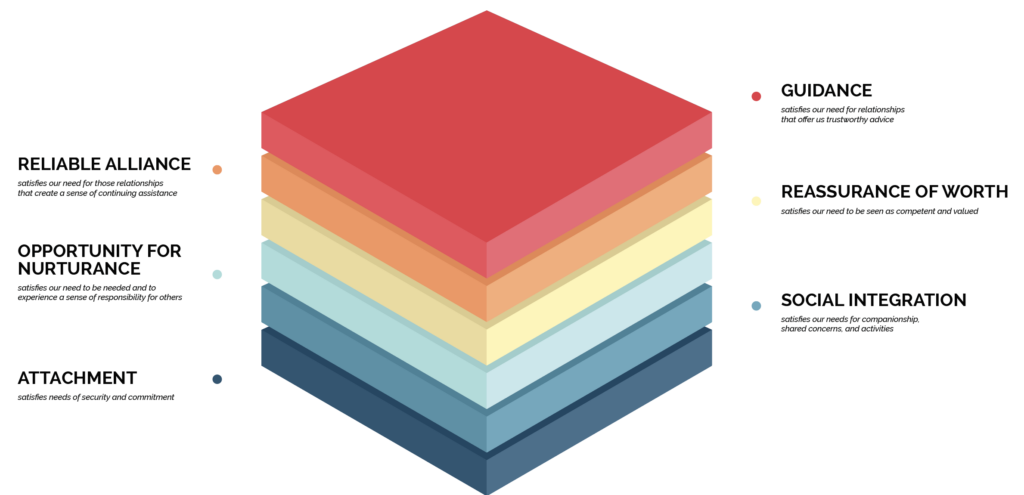
In response to the Surgeon General’s report, I would like to offer 8 ideas that I believe are underlying and driving much of the loneliness that is being experienced by so many of us:
1) The IRS must crack down on these so-called “churches” that have become a mouthpiece for political movements. Church attendance has been steadily declining, hitting below the 50% mark in 2020. These numbers are even worse after COVID.
The idea of church has been hijacked. These spiritual hijackers have made the idea of going to church one that is tainted with a fringe political ideology, instead of a sanctuary for understanding the human experience while in community with friends and neighbors.
Going to church isn’t for everyone, but it’s not for no one.
Churches have historically played an important role in communities, bringing people together and providing a place for connection to one another and the greater community. We must return to this idea.
But first, going to church has to lose the stigma of being a religious nutjob.
People have to be able to admit to their peer group that they go to church without the assumption being made about them that they are a lunatic.
We must purge churches of politics – and the IRS can do a lot to this end.
Holt-Lunstad J, Robles TF, Sbarra DA. Advancing social connection as a public health priority in the United States. Am Psychol. 2017;72(6):517-530
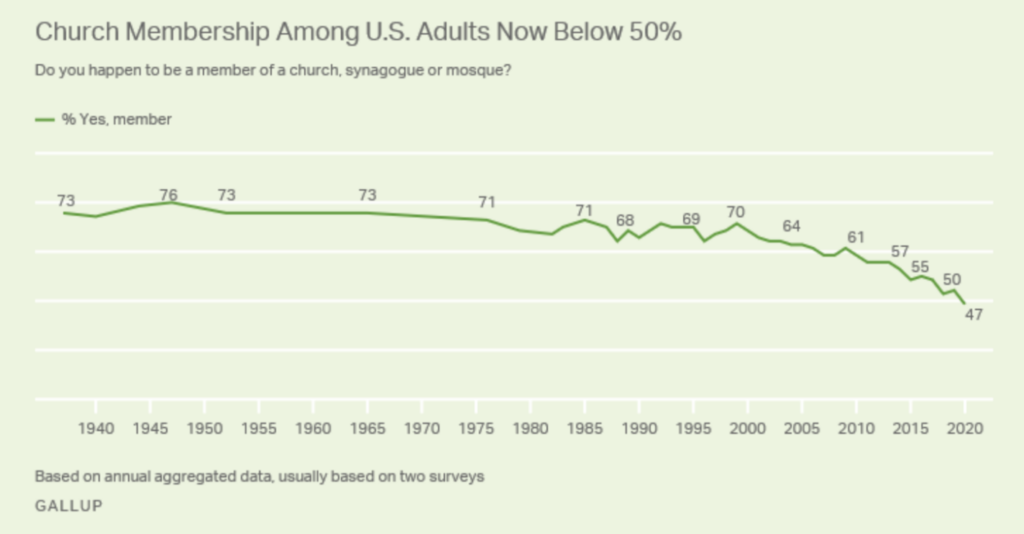
https://news.gallup.com/poll/341963/church-membership-falls-below-majority-first-time.aspx
2) We must recognize that social media isn’t good for overall health and well-being. I’m not advocating that it shouldn’t exist – but I am advocating that it be regulated.
Social media started to become ubiquitous in our lives sometime around 2012. I’ve marked on this chart when that happened – look at the trends. We can’t ignore this.
With the coming era of AI, we are in an even greater danger. Because AI can “talk” to us, expect to hear those companies start to sell their product as a solution to loneliness – not a contributor to it.
There is no substitute for real human-to-human connection. AI is only going to exacerbate this issue – because we’ll be fooling ourselves into thinking that we are creating a connection.
A computer is not, and will never be, a replacement for the connection we experience with another human being. We can regulate this one – AND – fix it ourselves. Just stop.
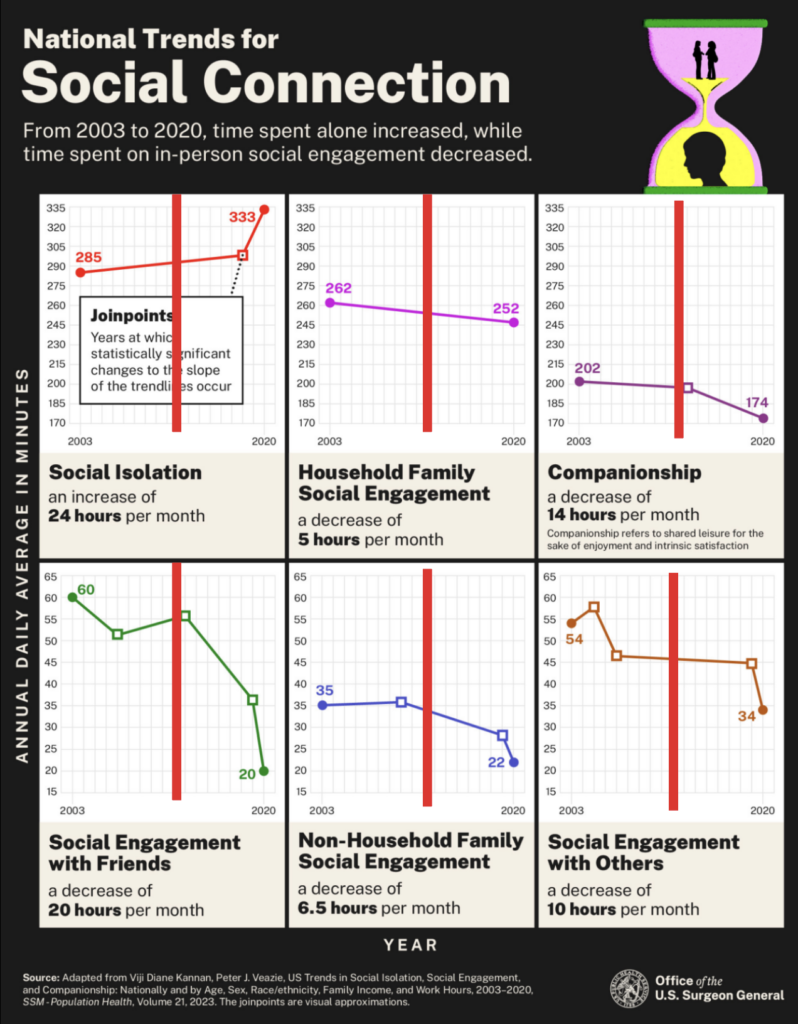
3) We have to go back to the office. I know I probably just lost a lot of you…but look… if you want to live in a healthy society, we have to show up for one another. Maybe you don’t need the office interactions your co-workers do.
Where I live, San Jose, our downtown is a ghost town. It’s empty most of the time. Downtowns should be vibrant places that are full of life and chance encounters with friends, co-workers, and neighbors. Businesses that office in any downtown should bring their people back to those offices.
We should be creating environments for social interaction – in offices and in the downtowns where they exist.
The following chart shows the percentage of workers returning to the office, demonstrating just how bad it is.
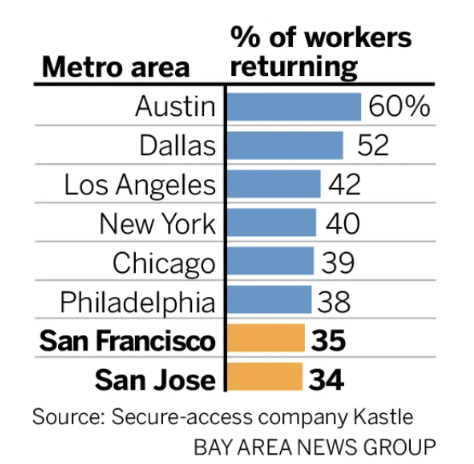
4) We have to stop shopping for everything online. I love Amazon as much as the next person. But we have to get back to being around other people in a shared experience.
Even when that experience is standing in the queue at a checkout line with other people -waiting for a real human being to scan our items and take our money.
This is one that we can all decide to do today – stop buying stuff on Amazon just because it’s easy.
Go support a local business owner and have a conversation with them.
Stand in line and look at people. Talk to the person working the check-out.
5) We have to address crime. That includes theft, random acts of violence on the street, and mass shootings.
No one wants to go outside their homes and meet other people when they live in fear that they will be a victim of violence.
We are going to soon be at a place where everyone is either a victim of or witness to gun violence – or knows someone who has been.
Unfortunately, this means a lot more death and trauma. It doesn’t have to be this way – we can do something about this – and we must.
Because it’s not just about gun violence (even though that’s enough), it’s about the culture of fear that is being created as a result and the natural inclination to avoid connection with others in public spaces.
If we want people to interact with one another, we have to get assault rifles off our streets, and we have to prosecute criminals and jail repeat offenders.
6) We need a national purpose. In recent years, we have become a profoundly, unserious country.
I believe that is directly related to our lack of a national purpose. As a nation, our shared conversation moves from crisis to crisis.
We are constantly reacting to the latest atrocity.
We need something that draws us into an appealing future.
Earlier generations had the Space Race – it inspired innovation in nearly every field.
We need a national purpose that brings us together and allows for the basis of conversation – common goals – shared ambition.
Going to Mars should never have been privatized. We as a nation should have rallied around the idea of a new frontier – one that WE achieved together.
We need to elevate, celebrate, and support big bold thinkers.
Climate change presents us with an opportunity for this kind of vision. This means that we must get money out of politics, and ….
7) Enact term limits for all members of Congress and the Supreme Court. Being a life-long politician should not be a career option for anyone.
Plus, regulating social media and other emerging tech is going to have to be done by a generation that understands it.
Representative government should be made up of representative voices that reflect their constituency.
The median age of America is 38 years old. The median age of a U.S. Representative is 58, while the median age in the Senate is 65.
On average, a U.S. Representative serves 4 terms, Senators serve 2.
But the folks in the leadership spots have been there a very long time – and it is they who drive the machine – making real change nearly impossible.
It’s time to enact term limits on Congress and the Supreme Court.
Yes – term limits impact loneliness – because policies impact loneliness.
https://sgp.fas.org/crs/misc/R41545.pdf
Young adults are almost twice as likely to report feeling lonely than those over. The rate of loneliness among young adults has increased every year between 1976 and 2019.
Kannan V, Veazie P. US trends in social isolation, social engagement, and companionship —nationally and by age, sex, race/ethnicity, family income, and work hours, 2003–2020. SSM – Population Health. 2023;Volume 21.
Buecker S, Mund M, Chwastek S, Sostmann M, Luhmann M. Is loneliness in emerging adults increasing over time? A preregistered cross-temporal meta-analysis and systematic review. Psychological Bulletin. 2021;147(8):787
8) We must ret-invent education. From pre-k onward, but specifically…
The college experience isn’t sitting in front of a computer taking a class.
The college experience is going to parties with friends, going to an athletic event, being in a fraternity or other service organization, and developing relationships with professors who become mentors.
We’ve turned college into a profit-generating machine. This must stop.
We’re all aware that a high-school education is no longer sufficient if we are going to remain competitive on the world stage.
Post high school, students should either go to a college or trade school (in-person and not saddled with debt when they leave), or national service (think Peace Corps or military).
Lifelong friends are made through these experiences – these are people that will fill one of these stacks of loneliness for the duration of a person’s life.
No, these things alone are not going to completely solve the epidemic of loneliness. But it is a start to how we should be thinking about ending it.
It’s an opportunity for a conversation about how to approach the underlying issues that are creating loneliness – and that loneliness is creating.
Throwing more money at the problem itself completely ignores the contributing factors.
But don’t be surprised when you see a commercial for a pill that cures loneliness. Or a chatbot that will be your best friend for $x.yy per month. We are so much better than this.
We must address those issues that are telling our survival instincts to avoid connection – to isolate ourselves – to be suspicious of people.
We have survived as a species because of COOPERATION! We are wired to help one another.
We must create the conditions in which those mindsets are able to once again become a reality.

